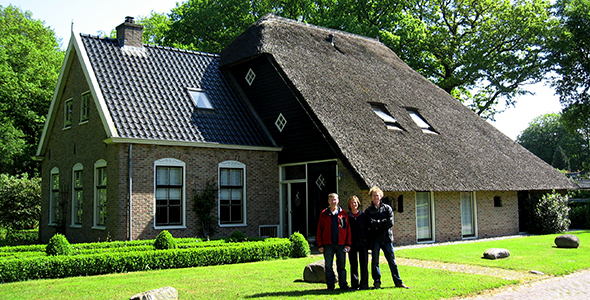Identity is a complex thing. People who know me know I’m from Canada, despite living in the USA now. People here, in Boulder, know me as the Canadian if they can’t remember my name.
When I go home, however, people call me the American. Live in any country other than your own long enough and this will happen to you – it’s basically inevitable. My identity – like yours – can’t be boiled down to a nation, a religion, a TV show or anything else.

My Oma’s childhood home in Diever, Drenthe, The Netherlands
Last week I, and my family, visited the Netherlands. As I said: identity is complex, and that was true even before I moved to the USA. All my life my grandparents have spoken of The Netherlands as the proverbial Old Country. I grew up calling them Oma and Opa, and Dutch baked goods were always plentiful. The church we attended was full of other immigrant families much like ours, and as a kid it just all just seemed normal. At one point I actually thought all old people had a Dutch accent, because just about every old person I knew did.
I’m Canadian. I’m also, at this point, kind of American (though not if you check my passport). And while visiting The Netherlands, I also felt strangely at home.
Don’t get me wrong – there were ways in which it was foriegn. The language isn’t one I speak – beyond what three months of Rosetta Stone can do, anyway – and almost all the traffic signs I saw meant nothing to me. We didn’t know what a red X through a blue circle meant until checking Wikipedia at home (it means no stopping).
But in other ways, however, I felt right at home. We visited my grandparent’s home town (Diever, in Drenthe) and almost all the last names we saw there were shared with people from home – an effect, I was told, of immigrants tending to cluster with people from their home towns. The baked goods, of course, were familiar – albeit much less stale than we were used to (seriously, Stroopwaffles are so much better than I thought as a kid…and I freaking loved them). And the general atmosphere was simply comfortable.
Identity is complex. I’m Canadian, I’m American, but my ancestry is entirely Dutch. I’m glad I took this trip, because now I know just a little more about what that means – and find myself wanting to know more.
Mom and Dad: thanks for flying us all out there. It was one of the best weeks Kathy and I have ever had, and I’m sure my siblings feel the same. I’ll do all I can to get more video out there in the weeks to come – I’ve got a lot of footage to sort through now.
Everyone else, I’m wondering: do you know where your family comes from? What does that mean to you? Comments, below: you know what to do.


4 responses to “Who Are You? Thoughts On Identity”
Justin, I enjoyed this. I have had similar feelings visiting the Netherlands…just feeling comfortable and a strange sense of at-home-ness there. It surprised me a little to go to a land I’d never been to before and find so many of the guitar strings of my identity resonating. The complexity of identity is indeed fascinating.
Funny that you thought all old people had a Dutch accent. As a single person, I found (the very few) young men with Dutch accents I ran across pretty attractive, mostly because they sounded like my beloved Granddad.
“Strange sense of at-home-ness” really does cover it. Glad to know it’s not just me.
I thoroughly enjoyed the article on “Identity”.
It also made me think of how accents can play a a part as well.
My wife and I are Scottish born and educated. We came to Canada when we were 40 and have lived her for 33 years. We have been back to Scotland (we call it going home !!) 3 times and because we still have the accent, no-one knows the difference. Our Scottish friends still view us as Scots and that is what I find interesting. The other fact is that I have met people in Canada who migrated from Scotland over 50 years ago and STILL talk about going HOME for a holiday (not a vacation). I once found myself in a very heavy discussion, almost argument with a woman who simply could not understand why a Canadian citizen would refer to Scotland as “Home” I told her that Canada is where I live and I love it and would never change it, but Scotland was still home. That statement made her mad. What does that say about Identity.?? Incidentally, this woman was born in Germany and left there when she was five years old. !!
This is such a great comment, I didn’t even think about accents.
Interesting thing about my grandmother: when she goes back to the Netherlands, people tell her she sounds like an old movie from the 1950s or something. The accent people have the Netherlands evolved during the 50 years she spent speaking mostly English, so she stayed frozen in time.